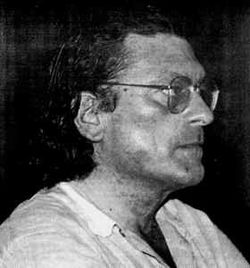Difference between revisions of "Thomass, Eugen"
| (3 intermediate revisions by 2 users not shown) | |||
| Line 1: | Line 1: | ||
| − | [[Image: | + | [[Image:ThomassEugen.jpg|right|thumb|250px|Thomass Eugen]] |
== Biography == | == Biography == | ||
Born: December 24, 1927<br /> | Born: December 24, 1927<br /> | ||
| − | + | Died: January 21, 2009,<br /> | |
| + | |||
Country: Munich, Germany<br /> | Country: Munich, Germany<br /> | ||
| Line 11: | Line 12: | ||
Teachers: [[W. Geierhaas]], [[Hans Rosbaud]], [[M. Hindemith]], [[R. Hindemith]] | Teachers: [[W. Geierhaas]], [[Hans Rosbaud]], [[M. Hindemith]], [[R. Hindemith]] | ||
| − | + | ||
| − | + | ------------------- | |
| + | Since the early 1960s, Thomass has written music for film and television. His works include the music for the television film Orden for the prodigies (1963), the series Graf Yoster is the honor (1967), the biography of Karl May (1974), the series Police Inspection 1 (1977) to the series These Drombuschs (1983 ) and the fantastic TV movie Zucker - A really sweet catastrophe . In this context, his many years of collaboration with the director Rainer Erler should be emphasized. In 1982, Eugen Thomass won the Musical Prize of the City of Hagen , among the judges was, among others, Udo Jürgens, "Kasi and Cress" was the name of the work that Thomass had submitted and which was realized in the same year and premiered in Hagen. | ||
| + | |||
| + | Eugen Thomass withdrew in his old age largely from the music scene. He last lived in Switzerland and also had a domicile in the French Ménerbes . He was buried at the Waldfriedhof Grünwald . | ||
| + | |||
| + | Eugen Thomass is the great-uncle of actress Rosalie Thomass.<ref>https://de.wikipedia.org/wiki/Eugen_Thomass</ref> | ||
== Works for Percussion == | == Works for Percussion == | ||
| Line 30: | Line 36: | ||
<!-- {{DEFAULTSORT: Lastname, Firstname}} --> | <!-- {{DEFAULTSORT: Lastname, Firstname}} --> | ||
[[Category:Composers]] | [[Category:Composers]] | ||
| + | [[Category:German Composers]] | ||
| + | [[Category:Percussion Ensemble]] | ||
| + | [[Category:Percussion Duet]] | ||
| + | [[Category:Percussion Duo]] | ||
| + | [[Category:Percussion (2)]] | ||
| + | [[Category:Marimba]] | ||
| + | [[Category:Vibraphone]] | ||
<!-- Don't forget to add categories, literature, instruments, history, pedagogy, sticks, etc. Also delete the Template category. To see what categories are available, see: http://www.tekpercussion.com/Special:Categories --> | <!-- Don't forget to add categories, literature, instruments, history, pedagogy, sticks, etc. Also delete the Template category. To see what categories are available, see: http://www.tekpercussion.com/Special:Categories --> | ||
Latest revision as of 12:09, 8 June 2018
Biography
Born: December 24, 1927
Died: January 21, 2009,
Country: Munich, Germany
Studies: Musikhochschule München
Teachers: W. Geierhaas, Hans Rosbaud, M. Hindemith, R. Hindemith
Since the early 1960s, Thomass has written music for film and television. His works include the music for the television film Orden for the prodigies (1963), the series Graf Yoster is the honor (1967), the biography of Karl May (1974), the series Police Inspection 1 (1977) to the series These Drombuschs (1983 ) and the fantastic TV movie Zucker - A really sweet catastrophe . In this context, his many years of collaboration with the director Rainer Erler should be emphasized. In 1982, Eugen Thomass won the Musical Prize of the City of Hagen , among the judges was, among others, Udo Jürgens, "Kasi and Cress" was the name of the work that Thomass had submitted and which was realized in the same year and premiered in Hagen.
Eugen Thomass withdrew in his old age largely from the music scene. He last lived in Switzerland and also had a domicile in the French Ménerbes . He was buried at the Waldfriedhof Grünwald .
Eugen Thomass is the great-uncle of actress Rosalie Thomass.[1]
Works for Percussion
8 Miniaturen für Marimba und Vibraphon – Percussion Duo; Marimba; Vibraphone
References
